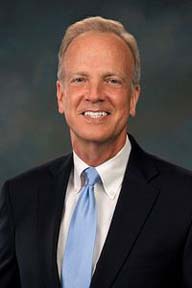ELLY GRIMM
• Leader & Times
The maintenance of rural hospitals continues to be a hot topic and recently, some legislation was introduced to help with just that.
Wednesday, Sen. Jerry Moran and Sen. Tina Smith (D-Minn.) introduced legislation to expand access to federal resources for rural hospitals through the Rural Emergency Hospital (REH) Medicare designation.
“The Rural Emergency Hospital Improvement Act would increase opportunities for Critical Access Hospitals (CAH) and rural hospitals to convert to an REH and make technical improvements to the designation,” a release from Moran’s office noted. “These changes would help make the conversion to an REH more appealing by giving rural hospitals facing closure access to critical resources from the federal government to remain open.”
“Access to emergency health care saves lives and helps rural communities prosper,” Sen. Moran noted in the release. “Too many rural hospitals in Kansas and across the country are struggling to keep their doors open, and this legislation offers those hospitals a lifeline. The Rural Emergency Hospital designation has already helped save numerous rural hospitals, and expanding access to this successful program is a common-sense way to make certain more hospitals stay open.”
“Rural hospitals provide health care in areas where it isn’t otherwise easy to access, so when their doors close, communities are left with almost no options, and that’s dangerous. If you’re dealing with a medical emergency or you just went into labor, the last thing on your mind should be whether your local hospital is still open,” Senator Smith noted in the release. “This bill is about public safety. It will make sure that if a hospital is in truly dire straits, they can remain open for emergency care, including obstetric care. Created as part of the Consolidated Appropriations Act of 2021, REH is a new Medicare provider designation that offers certain rural hospitals the opportunity to convert and continue operating with limited services rather than closing. The provisions in the REH Improvement Act are the result of numerous conversations Sen. Moran held with rural health care providers and CEOs of hospitals that are eligible for the REH designation.”
The Rural Emergency Hospital Improvement Act would:
• Allow previously closed rural hospitals to re-open and apply for the Rural Emergency Hospital designation if they can demonstrate they met all eligibility requirements between Jan. 1, 2015 and Dec. 27, 2020.
• Direct the Secretary of Health and Human Services (HHS) to create a waiver program for facilities operating similarly to an REH in order to convert to an REH.
• Allow REH facilities to maintain or create a unit for inpatient psychiatric care, obstetric care and allow for limited inpatient rehabilitation services.
• Require the Centers for Medicare & Medicaid Services to provide additional funding for laboratory services.
• Clarify that REH facilities are eligible for Small Rural Hospital Improvement grants.
• Direct the Secretary of HHS to allow an REH to be eligible as a National Health Service Corp site.
• Authorize REH facilities to transfer patients from acute care to a Skilled Nursing Facility without leaving the hospital, in accordance with the Social Security Act.
• Allow an REH facility to revert back to a Critical Access Hospital (CAH) to regain necessary provider status, only if the facility was designated a necessary provider prior to converting to REH.
The issue had also been discussed during a press conference in Liberal back in March.
“From April 2021 through April 2023, I served on the SWMC Board of Trustees and gained an acute awareness of the financial struggles rural hospitals faced coming out of the COVID-19 pandemic,” Liberal Mayor Jose Lara noted at the press conference. “During that time, the hospitals in our sister cities, Dodge City and Garden City, were bought out by a corporate health system. That might bring more funds and flexibility to those hospitals in the short term, but the loss of local control and the ability of the local hospital to focus on local issues quickly fades as the focus instead turns toward profitability instead of quality healthcare. During many meetings with City of Liberal leadership and our economic expansion teams, it is obvious we take our hospital for granted – we are currently focused on population growth, utility access and all the other prerequisites required for expansion. But, we must always be vigilant about the status of our local hospital because all that growth will be lost if we lose this amazing resource. A hospital is a necessity for any large-scale expansion we do in the city, and a popular saying among City leadership is 'A city cannot grow without a strong hospital.’”
“We have become a healthcare desert in the middle of America. We're experiencing an unprecedented healthcare worker shortage because those professionals are leaving in droves to other states that have higher paying jobs and better benefits that have expanded Medicaid,” Gov. Kelly also noted at the press conference. “Our rural healthcare system is in crisis – eight rural hospitals have closed and of the facilities that remain, 58 percent are at risk of closure, and 28 percent are at risk for immediate closure. Just last month, the CareArc Health Clinic in Eureka, which has offered dental, medical and behavioral health services to Greenwood County and Woodson County residents for many years, became the most recent healthcare facility to close its doors. I don't know how many more healthcare facilities have to close before we expand Medicaid in Kansas, but the answer should be 'ZERO.'”








